
Puzzle Games Like 15 Puzzle Boost Cognitive Growth in Kids on Gridplay
As a parent who’s spent countless evenings piecing together jigsaw puzzles with my kids, I’ve seen the spark in their eyes when they solve a tricky challenge. That same magic happens with digital puzzles, like 15 Puzzle - Collect a Picture on Gridplay. Our platform, now nearly five months strong, offers free HTML5 games that are both fun and secretly brain-boosting. This sliding tile puzzle, where kids rearrange tiles to form vibrant pictures, is a standout in our puzzle category. In this article, I’ll dive into how puzzle games fuel cognitive growth, drawing from my own parenting experiences, insights from educators, and research to show why they’re a smart choice for kids—when paired with mindful supervision.
Why Puzzle Games Are Brain Food
Puzzles aren’t just games; they’re workouts for the mind. In 15 Puzzle - Collect a Picture, kids slide tiles on a grid to reassemble scrambled images, like animals or landscapes. This process engages the prefrontal cortex, the brain’s hub for planning and problem-solving. A 2016 study in Educational Psychology Review found that spatial puzzles improve cognitive flexibility by up to 18%, helping kids tackle subjects like math or coding. My son, who’s 8, started noticing patterns in his math homework faster after regular puzzle sessions, a real-world win I hadn’t expected.
The game’s challenge—described as “not easy” in its tagline—requires kids to visualize how tiles fit together, sharpening spatial reasoning. This skill is critical for geometry and even future careers in fields like engineering. I’ve watched my daughter, after playing 15 Puzzle, breeze through physical jigsaw puzzles, showing how digital skills transfer to hands-on tasks. Similarly, match-3 games like Cooking Match on Gridplay teach pattern recognition, another cognitive building block for reading and logic.
Boosting Focus and Memory
Puzzles demand sustained attention, a rare feat in a world of distractions. Unlike fast-paced games, 15 Puzzle encourages kids to focus deeply as they strategize moves. A 2018 study in Cognition showed that kids playing puzzle games improved working memory, helping them remember instructions or sequences better. I’ve seen this with my kids—after a session, they’re more attentive during homework, recalling steps without constant reminders.
The game also builds patience. Each puzzle level ramps up in complexity, pushing kids to try multiple strategies. This trial-and-error process mirrors real-life problem-solving, like figuring out a science project. A teacher friend told me she uses similar puzzles in class to teach logical sequencing, noting how kids who play them often excel in group tasks requiring focus.
Emotional and Cognitive Perks
Beyond academics, puzzles teach emotional resilience. Getting stuck on a tough picture in 15 Puzzle isn’t defeat—it’s a chance to retry and learn. Psychologists link this to a growth mindset, where kids see challenges as opportunities. My daughter’s proud grin after solving a tricky puzzle speaks volumes about the confidence it builds. The game’s non-competitive nature ensures kids focus on personal achievement, not rivalry, fostering self-esteem.
Some parents on forums like Common Sense Media note that puzzles can calm kids with attention challenges, like ADHD, by providing structured tasks. However, others point out that slower games might not hold every child’s interest—mixing with action games like Ticktock Egg Run can keep things varied. For a deeper look at gaming benefits, check our main article on how games boost kids’ brain development.
Tips for Parents to Maximize Puzzle Play
To make puzzle games a positive experience, supervision and balance are key. Here’s how to do it:
- Set Short Sessions: Limit play to 20-25 minutes, as suggested by pediatric guidelines, to avoid eye strain and keep focus sharp.
- Engage Together: Play 15 Puzzle with your kids, asking, “Which tile should we move next?” to spark critical thinking.
- Link to Real Life: Pair digital puzzles with physical ones, like jigsaws, to reinforce spatial skills.
- Celebrate Wins: Use the “Share This Game” feature to share completed pictures with family, boosting your child’s pride.
- Mix Game Types: Alternate with Cooking Match or other puzzles in our puzzle category for variety.
Some parents worry puzzles might bore action-loving kids. If that’s the case, try balancing with faster-paced games or outdoor activities. Supervision ensures kids stay safe and engaged in Gridplay’s ad-free environment.
Community and Expert Insights
Parents and educators are fans of puzzles for good reason. A mom on Reddit’s r/parenting shared how puzzles helped her son with focus issues excel in math, echoing studies showing cognitive gains. A teacher I spoke with uses digital puzzles to teach planning, noting kids apply these skills to group projects. On the flip side, some parents say puzzles can frustrate impatient kids—start with simpler levels and build up.
Why Choose Gridplay for Puzzle Fun?
Gridplay.biz.id offers a safe, ad-free platform with Google-indexed games like 15 Puzzle - Collect a Picture. No downloads, just instant fun on any device. Compared to ad-heavy apps, our curated selection prioritizes quality. For more brain-boosting games, explore our kids’ category.
In short, puzzle games are a fun way to grow young minds. From my family’s game nights, I can say 15 Puzzle delivers both joy and smarts. Dive in at Gridplay and watch your kids’ brains light up!